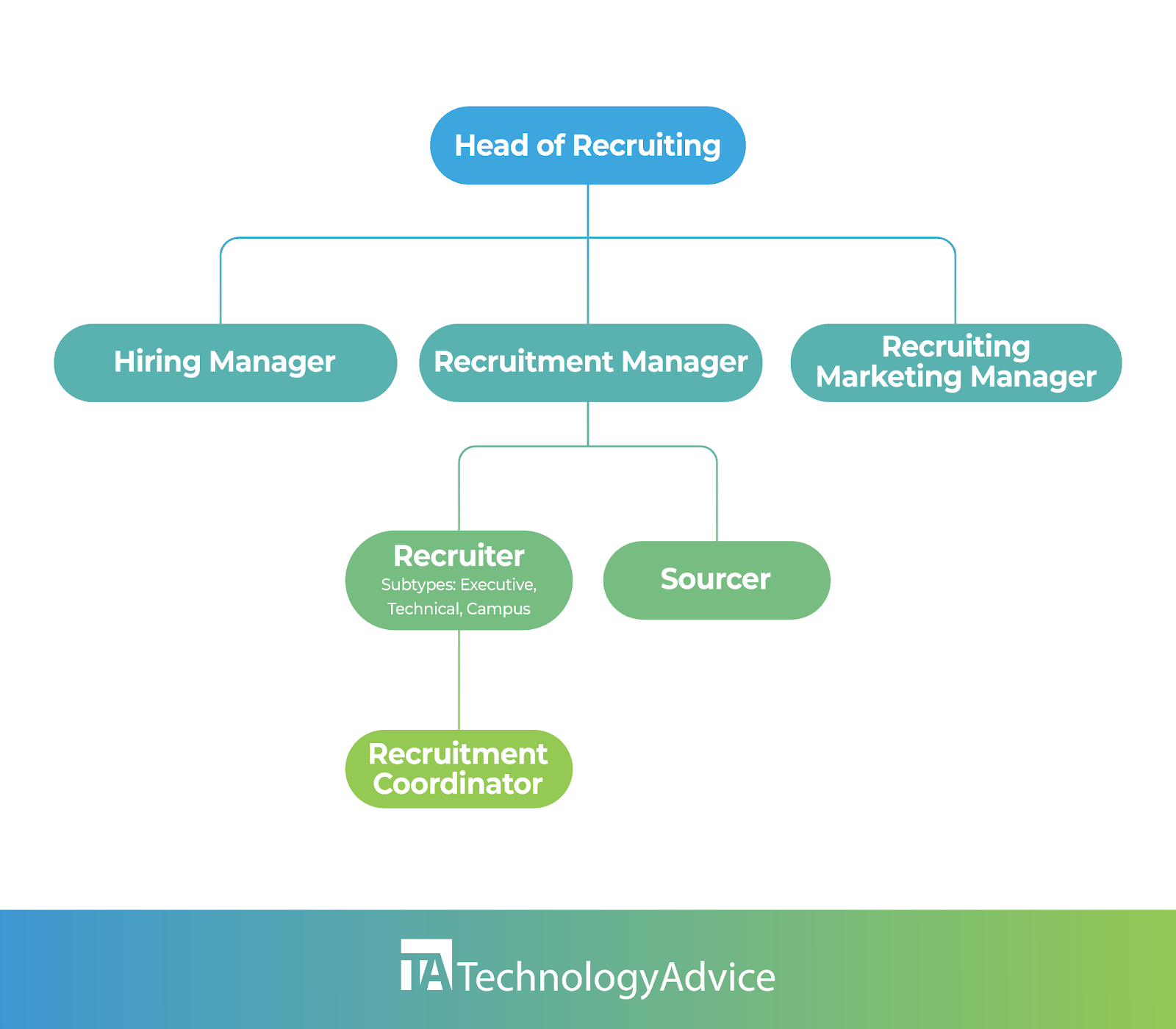Key takeaways
Recruitment team responsibilities
An internal recruitment team’s responsibilities cover a range of duties around hiring talent in pursuit of big-picture company objectives. These duties include:
- Sourcing: Identifying and attracting potential candidates for open positions via job boards, social media, and networking events.
- Nurturing: Building and maintaining relationships with potential candidates through regular communication and engagement.
- Assessing: Evaluating candidates through interviews, skills assessments, and screenings to determine whether to make an offer.
- Hiring: Extending job offers and managing the initial steps of the onboarding process, such as issuing offer letters and coordinating preboarding activities to help with the transition before the HR team takes over.
Why have an internal recruitment team?
An internal recruitment team gives your company the power it needs to hire big and fast during a growth spurt. Internal recruiting teams also make it easier to find highly specialized talent because the team already knows your company culture, business priorities, and other expectations.
Recruiting team roles
A well-rounded recruitment team may consist of the following roles: department heads, hiring managers, recruitment managers, recruiters, recruitment coordinators, talent sourcing specialists, and recruitment marketing managers.

Sourcer
Also known as talent sourcers or candidate sourcing specialists, sourcers are niche roles in the recruitment department. A talent sourcing specialist:
- Identifies and adds top candidates to an open role through job boards, social media, events, and other creative means.
- Proactively finds and engages with candidates to support departmental needs or diversity hiring.
- More common in large companies and industries with high turnover.
Recruitment coordinator
They also go by the titles hiring coordinator, staffing coordinator, and talent coordination specialist. Typically, enterprise companies leverage recruitment coordinators to support recruiters by handling preparatory tasks throughout the hiring process. A recruitment coordinator:
- Manages the logistics of the recruitment process.
- Assists recruiters and talent sourcers in scheduling meetings, interviews, and assessments.
- Creates offer letters and running background checks.
Recruiter
Recruiters act as the primary point of contact for all parties involved in the hiring process. A recruiter:
- Collaborates with hiring managers to understand the specifics of each open job requisition.
- Writes job descriptions.
- Conducts preliminary interviews.
- Presents qualified candidates to the hiring manager.
- Acts as the primary point of contact for all parties involved in the hiring process.
- Handles the job offer process, including negotiation and feedback.
Technical recruiter
- Specializes in filling technical roles in IT such as software design, engineering, etc.
- Common in niche industries.
Campus recruiter
- Specializes in campus recruiting with colleges and business schools to fill entry-level roles.
- Often travels to schools to participate in job or career fairs and conduct interviews.
Executive recruiter
- Specializes in hiring for C-suite level positions.
- Usually has a wider professional network with more experience and seniority because of the expertise needed to recruit at this level.
Recruitment marketing manager
A recruitment marketing manager can also be someone from the marketing department. A recruitment marketing manager:
- Oversees the marketing efforts specifically for promoting job openings.
- Acts as a liaison between the marketing and recruiting teams.
- Boosts employer brand by creating marketing campaigns that highlight the company’s culture and values.
Hiring manager
Hiring managers collaborate with recruiters to initiate and guide the recruitment strategy for the role they want to fill. A hiring manager:
- Submits job requisitions.
- Defines the scope, responsibilities, and requirements of the job.
- Has the final say in candidate selection.
Recruitment manager
Recruitment managers work closely with department heads and hiring managers to understand their hiring needs. A recruitment manager:
- Oversees teams of recruiters and sourcers.
- Designs and implements big-picture recruitment strategies.
- Manages the recruitment budget to optimize spending.
- Tracks recruitment metrics to assess the team’s performance.
Head of recruiting
Large companies usually have a separate head of recruiting who reports directly to the head of human resources or CEO. However, in smaller companies, this duty falls under the head of HR. In either case, the head of recruitment:
- Oversees recruitment managers and teams to ensure that the recruitment goals are met.
- Manages relationships with external vendors like recruitment agencies.
What’s the right size for your recruiting team?
The right internal recruitment team structure depends on your company’s size, hiring needs, and recruitment staffing budget.
Company size
Hires per year
Recruitment team size
Recruitment team roles
Startups & small businesses
10
1
Usually, the CEO or founder assumes the recruitment responsibilities.
Mid-market businesses
10–50
3–4
- Recruiter.
- Recruitment coordinator.
- Recruitment manager (Depending on the business’s needs, the company can assign a dedicated recruitment manager. Otherwise, the owner or head of the HR department can assume this role).
Growth-stage businesses
20–100
4–5
- Head of recruiting.
- Recruiter.
- Sourcer.
- Recruitment coordinator.
- Recruitment manager.
Large/enterprise companies
100–1000
7+
- Head of recruiting
- Recruitment manager
- Recruiter(s)
- Sourcers
- Recruitment coordinator
- Recruitment marketing manager
- Hiring manager
How to build an internal recruiting team
Before you can ramp up your headcount growth, you need to find the people who will do the hiring. As with any recruitment process, there are a few key considerations to keep in mind:
- Consider your organization’s anticipated hiring volume, the complexity of open roles, industry-specific demands, and existing HR capacity to determine how much internal support you need and which recruiting roles will be most impactful.
- Establish competitive salary ranges for each recruiting role based on industry benchmarks and your company’s financial projections.
- Define each recruiting role’s essential duties to ensure the expectations are realistic and aligned with organizational objectives.
- Outline onboarding objectives including training requirements and productivity milestones.
- Develop long-term career paths for each role to support employee growth and engagement.
When should you consider outsourcing?
You should consider outsourcing your recruitment process in any of these situations:
- Your company lacks the expertise or resources to execute effective recruitment strategies.
- Your internal team is overwhelmed by the volume of incoming applications.
- You need to scale up your workforce quickly, like during seasonal hiring or company expansions.
- You need to fill a niche or high-skill role.
- You need a reliable talent pipeline and want to maintain a pool of pre-vetted candidates ready for future vacancies.
- Your organization is experiencing high turnover.
In these cases, a third-party recruitment agency or recruitment process outsourcing (RPO) provider gives you access to a broader range of resources, expertise, and networks to tackle complex hiring challenges. An external recruitment team can manage all or part of the process and guarantee quality hires while reducing the administrative burden on your internal staff.
However, many organizations benefit from a mix of both approaches. For instance, an internal recruitment team may handle most day-to-day hiring needs and collaborate with an external agency to tap into a broader or more specialized talent pool.





